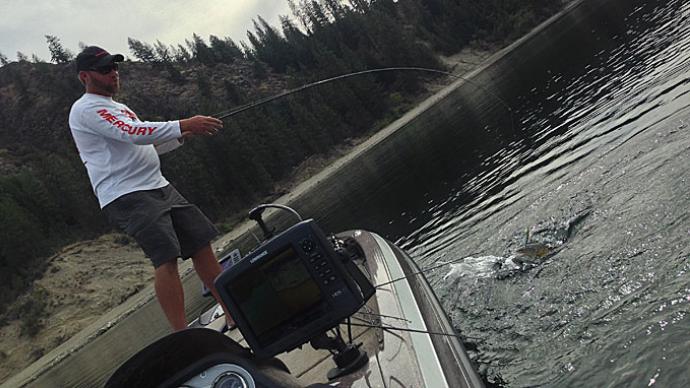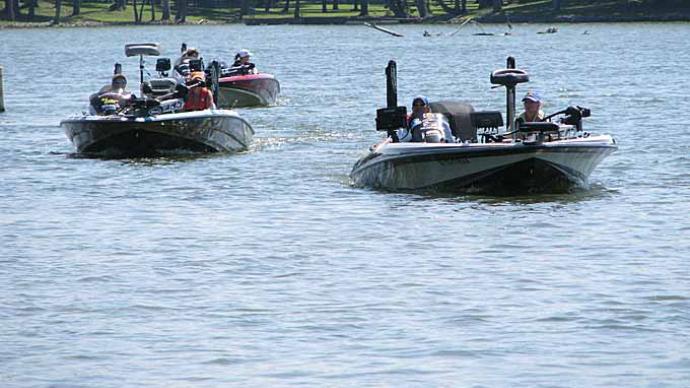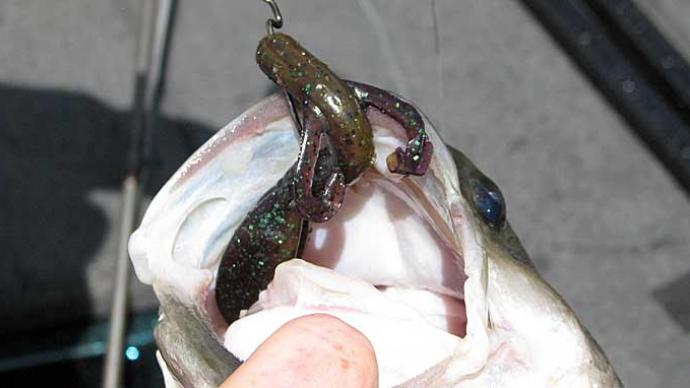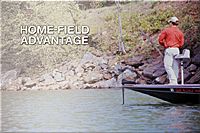
When a regional bass-fishing tournament series scheduled its events on his home water, bass-fishing guide and tackle-shop owner Lee Howard of Hiawassee, Ga., believed the 10-event tournament series on Lake Chatuge could easily swing his way. As he began to outline his tactics, the lake's blue-green waters, just across a busy highway beyond his shop, promised Howard a bounty.
By the time the tournament series ended with "The Classic" – an event in which the field comprised anglers who placed in the top five of any of the ten weekly tournaments – Howard would have every reason to expect to finish high on the leaderboard. He lives – professionally and personally – to bass fish. He consistently finishes in the top five weekly tournaments organized by local clubs and sponsors on the 7,000-acre lake in the southern Appalachian Mountains.
"You can't help but build up a certain amount of confidence when fishing on the waters you know best," said the 39-year-old veteran bass fisherman. "And there's nothing wrong with that, but you've got to watch out for growing overconfident. When you do, you put blinders on."
There's little argument that confidence is key to successful bass fishing anywhere. It's echoed in every victory speech espoused by amateur and professional bass anglers. Howard's confidence is steeped in a resume of local wins that led many of his competitors and members of his family to urge him to join the ranks of anglers in the Bass Fishing League Gator Division. A native of Vero Beach, Fla., Howard chose the far-south bass-fishing series after considering that much of his best tournament-fishing days were spent on his former home waters of Florida's lakes Toho, Okeechobee, Blue Cypress, and Kissimmee, among which he has scored five victories overall.
Howard's home waters today include a host of lakes scattered across Georgia, including the mountain lakes Burton and Nottely; renowned Lake Sidney Lanier; and longtime bass-fishing favorites Lake Seminole, West Point Lake, and Lake Eufaula. It is Lake Chatuge, however, that Howard believes is the most significant asset in his portfolio of home waters. His performances there in 2002 include one first, three seconds, and "never a place below fourth" in the 15 events he entered.
Howard said that prepping for a tournament on home water certainly should be easier for local anglers if for no other reason than the knowledge derived from frequently fishing the lake.
"A fishing log can make it easier to review the history of your catches," he said, "but if you fish frequently, you're also likely to know where the fish are day to day, season after season, year after year. Bass are creatures of habit, but they react to locally sensitive events (in a way that) a visiting angler might not recognize or have had the time to learn." However, Howard is quick to point out that a local angler's database of home-water knowledge should never displace scheduling several days of practice.
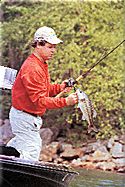
"Pre-fish the lake like it's not your home lake," he said. "Go with what you know to confirm your patterns and hot spots, but always be prepared to fish the lake like it's not your home lake. Despite everything you already know about the lake, you must keep an open mind and be prepared to change tactics when the conditions – and your immediate success in catching bass – demand you make changes in your best-laid plans."
Howard said that the effort is probably best described as "observation," and he believes a local angler is likelier than a visiting angler to make poor working observations.
"That's when a local angler can work against himself," he said. "If he's not careful, he's less apt to make key on-the-water observations because he thinks he knows the fish patterns, and his already-gained experience has pinpointed the best bass structure in the lake.
"Visiting anglers already recognize that they're at a disadvantage before the tournament begins. That's why, without doubt, a good visiting bass fisherman won't miss the signs that signal a need to change baits, tactics, or location."
As the tournament date nears, Howard likes to revisit his local contacts, who may or may not be competing anglers in the event, to gather details about current fishing conditions and patterns. As long as they're associated with the lake and its fishing resources, no one stands apart from Howard's information resources. He says local anglers find this an easy chore, whether lakes are situated in rural or heavily developed areas. He insists that every good bass lake is surrounded by folks in the know who are willing to build working relationships with quality anglers.
"These include the obvious local tackle shops and marina owners, but I also seek advice from local boat dealers and mechanics, fisheries officials, and restaurateurs who cater to fishermen," he said. "When a tournament is on the line, I'm willing to listen to anyone, but I've also got to filter that information and make it work to the best of my abilities." Howard also listens to the fish. Yep, the fish.
"If you listen to the fish, they'll tell you what they want," he said. "It might not always be in black and white, but you've got to listen to them, especially under changing weather and water conditions and across the seasons as they move up and down in the water column, from structure to flats, from baitfish to crawfish, from an aggressive bite to a light feed. These issues in flexibility drive the success of the best bass fishermen, locals, or visiting anglers. You have to know when – and how – to adapt."
The home-lake curse
While there are many good tournament finishes for local bass anglers, there are bad ones for local experts, too, who seem to be cursed at times despite great day-to-day success on their home water.
It seems a whammy was bestowed upon Howard's finish in last season's local Classic tournament on Lake Chatuge, his home lake.
"It had to be that some sort of voodoo was put on me that day," he said jokingly. "During the week ahead of the Classic, the fish had been in 10 to 12 feet of water. I was setting up great patterns for tournament day and was full of confidence that I would finish high up the leaderboard."
However, Howard said his confidence in patterning the bite in the days ahead of the event actually stifled his success after the tournament began. Despite his advice that warns anglers against being overconfident, Howard said his intense local knowledge played against him.
"There was no obvious change in the weather or water conditions to make them move, but I found out at the weigh-in that the fish had moved off the mid-depth brush piles and ledges and into 40 feet of water ... 40 feet of water!" he said. "I knew so well that those fish were up in the water column that it cost me the tournament."
| Beaver Lake – Wendlandt's home away from home |
|
Image
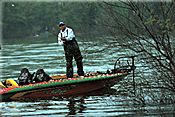
One thing that makes a house a home is the comfort embodied in its surroundings. So unique are these surroundings to individual homes that it's hard to find the same comforts whenever traveling on the road, or in this case, on the water. For pro Clark Wendlandt of Cedar Park, Texas, it's the comfort embodied in the environment of his home water – 19,000-acre Lake Travis – that he says is responsible for his apparent domination of the FLW Tour's annual Open on Arkansas' Beaver Lake. During the last four years, he has racked up two victories, two additional top-10 performances, and $420,000 in winnings on Beaver Lake. More than 450 miles from his home water on Texas' Colorado River, 36-year-old Wendlandt's bass fishing has flourished on the 28,000-acre impoundment on the upper White River near Rogers, Ark. These two rivers flow worlds apart in their character. Still, the lakes they pour into hold many similarities that Wendlandt says contribute to his success on Beaver Lake. "The reason (my fishing) has been so good at Beaver is because I'm comfortable there," he said. "I don't have the little demons running around in my head telling me to do this, do that. It's a lot like my fishing on my home lake. Lake Travis may not have the same kind of bass Beaver holds, but it has a lot of similarities – the water clarity, the rocky structure – and when you're fishing for a good limit on either of these lakes, you're not fishing for huge fish." So, tactics have nothing to do with his success on Beaver Lake? "I don't believe it has anything to do with the tactics," Wendlandt said. "Confidence – that's what good bass fishermen have over those who aren't doing as well." He admits, however, that he's also very comfortable with his tactic of choice – sight-fishing – and is, in fact, so comfortable with tossing Gambler tubes to fish on beds that he admits it's the primary tactic he plans to use to catch his winning stringers during April's Beaver Lake event. "There's no technique in bass fishing that's going to make every fish that's sighted bite," Wendlandt said. "But I use the days immediately ahead of the springtime tournament to eliminate a lot of acres of water. If it's a good lake, you can find too many fish when you pre-fish. You run your outboard more than the trolling motor, and you don't get to bearing down." Indeed, it was a strong sight-fishing offensive that Wendlandt struck out on last April in defense of his victories in the FLW Tour's Beaver Lake events in 1999 and 2001. And while he admitted in a post-fishing interview on day two of the tournament that he had developed a secondary pattern that was working pretty well, he also said sight-fishing contributed to his top catch of 20 pounds in the Pro Division in the first two days of the 2002 event. "I don't know why. I don't," he said of his remarkable success at Beaver. "Many people have asked me about that, but it's just how comfortable I am out there. I think guys get on streaks. They make the right moves at the right time. They get a good feeling, and they go with it. That's all I'm doing." |
Content provided by Bass Fishing Magazine, the official publication of FLW Outdoors


